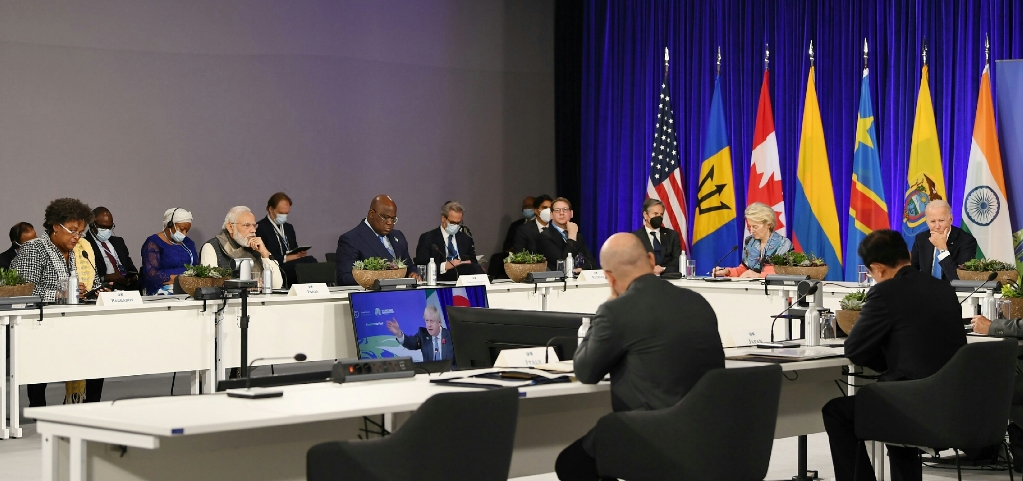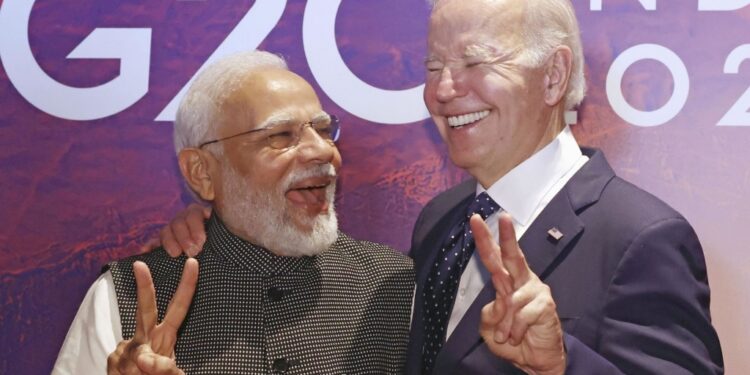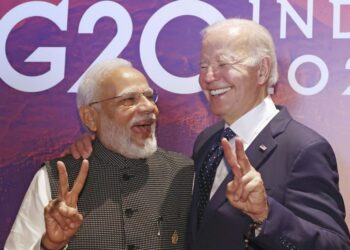India’s G20 presidency is set to shape the global narrative for easing of geopolitical issues towards the broader goal of international development and cooperation
BY B. SHEKHAR
It was a moment to cherish for a lifetime, as India formally took over the G20 presidency from Indonesia on December 1, 2022 with a promise that it will be a “catalyst for global change” at a “time when the world is simultaneously grappling with geopolitical tensions, economic slowdown, rising food and energy prices and the long-term ill-effects of the pandemic”.
Even though India has been part of G20 since its inception in 1999, this is the first time that the nation has earned its presidency due to India’s growing eminence of leadership globally on different verticals. True to its spirit of Vasudhaiva Kutumbakam (the world is one family), India will be a catalyst for global change in the coming 12 months before it formally hands over the presidency to Brazil in November 2023. Prime Minister Narendra Modi has gone on record as saying, “Today, we do not need to fight for our survival—our era need not be one of war. Indeed, it must not be one! Today, the greatest challenges we face—climate change, terrorism, and pandemics—can be solved not by fighting each other, but only by acting together.”
Guided by Modi’s vision, India’s foreign policy has very strategically and with a specific intent been evolving to undertake leadership roles on the global stage. The Covid-19 pandemic was an apt example of showing to the world that India cares for humanity despite the fact that the nation itself was under severe criticism of its handling of the pandemic. Also, India’s constant interaction with world leaders over the ongoing war between Russia and Ukraine has helped de-escalate and minimise hostile consequences for the world.

Implications of G20 presidency
In a significant step in this direction, the G20 presidency offers a unique opportunity for India to contribute to the resolution of pressing issues of global importance. If one takes a close look at the logo and the theme of India’s G20 presidency, it clearly reflects India’s message and overarching priorities for the world.
The G20 group literally constitutes a major chunk of the globe. Being a premier forum for international economic cooperation, representing around 85 percent of the global GDP, it commands over 75 percent of world trade, and includes about two-thirds of the planet’s population.
It is well recorded that the previous 17 presidencies of G20 delivered significant results for ensuring macro-economic stability, rationalising international taxation, achieving food security and relieving the debt burden on countries, among many other outcomes. It is here that India will benefit from these achievements and will build further upon these crucial global issues to achieve what it has always propagated: “Global Oneness”.
Tackling pressing global issues
India can play a key role in watering down the threat of using nuclear weapons, as it is increasingly likely that some nations have their fingers on the button. As a priority, in all likelihood, India will be addressing this crucial human existence issue during its scheduled meetings with world leaders.
The other challenges before G20 countries where India can play a key resolution role include stopping the war between Russia and Ukraine. The impact of Russia’s invasion of Ukraine has already disrupted the world on several counts, including disrupting supply chains, affecting food production and causing an oil crisis—leading to a spike in global inflation.
The sanctions and embargos by the West against Russia have only further queered the pitch. Persistently high inflation—at historic highs in several countries—has eroded purchasing power, thus dragging down economic growth which is a major concern that needs strategic planning to restore growth momentum. India has its hands full in tackling this issue.
In response to high inflation, central banks across countries have raised interest rate which in turn has dampened economic activity further. India, in the course of its scheduled economic meetings, will submit a comprehensive economic recovery roadmap with pragmatic reforms measures so that economies are back on the growth path once again. As of now, some of the biggest economies such as the US and the UK are set to face a recession; others, such as those in the European Union, are likely to slow to almost a halt.
Another major responsibility India is likely to take up is the de-risking of business and manufacturing hubs. It is a fact that China was the manufacturing hub of the world and continues to occupy that position. But the Covid-19 pandemic has shown how imprudent it was to depend on a single nation to source things for the globe. India, in addition to projecting itself as the upcoming manufacturing centre for the globe, will also showcase several other Asian nations as sourcing hubs for the world.
The world economy is struggling with geopolitical rifts such as the tensions between the US and China, the two biggest economies in the world, or the decline in trade between the UK and European countries in the wake of the Brexit decision. Easing of geopolitical issues will again be the top priority of India’s G20 resolve as this will automatically put economies on the growth trajectory. The lower the tension, the higher business and trade.
Maturing of India’s foreign policy
Discerning foreign policy watchers would have noticed how, despite its refusal to toe the US line on Ukraine and despite India defying the US-led sanctions against Russia, American leaders still seek closer ties with New Delhi. This stern stand turned out to be a boon for India as, after the US sanctions, Russia became India’s main source for oil imports at cheaper rates. India will very effectively use the same strategy to see all G20 nations benefit so that none suffers due to sanctions and embargos.
There is a marked change and boldness in India’s foreign policy think tank. India emphasises a doctrine of strategic autonomy in its diplomatic outreach, pursuing an interest-based foreign policy rather than aligning with any major power. This may cause major heartburn. India will therefore have its hands full in hosting the G20 leaders for the summit in New Delhi next year—and encouraging outcomes for global good. This sets the stage for India to act as a bridge between antagonists through diplomacy and dialogue.
Taking the lead in crucial areas
Another indispensable aspect which is prominent on India’s G20 presidency radar is the unprecedented opportunity to shape the global narrative in favour of reducing the carbon footprint and encouraging green energy and digitalisation as significant components of transformational changes. India will look at bridging the digital divide. It will push for unbanked population to integrate into the financial system. India has the largest ID system in the world, the Aadhaar Card, the Jan Dhan system, Direct Benefits Transfer (DBT) bank accounts and the largest mobile network in the world. This constitutes a readymade digital platform system for any nation to adopt and implement for its population. India would like the world to emulate and replicate these models, especially the developing nations.
There will also be a key focus on the use of technology to formulate digital solutions which can be implemented at a global level to create lasting and meaningful changes. In fact, the Covid-19 pandemic has shown to the world how adopting technology can provide a lasting solution to a vast majority of woes, be it industrial innovations or reaching out to the masses on the academic front, or touching millions of lives with medical help.
As far as international trade is concerned, though China cannot be immediately delinked, many nations are looking for an alternative to China and India is obviously the best alternative.
Another important and very crucial role that India has to play is with regard to food security. Due to the Russia-Ukraine war, food scarcity and food prices shot up substantially to very high levels. In order to control and manage the food crisis, India is pushing for using millets as the staple for some nations.
The UN has declared 2023 the International Year of Millets. Before the wheat revolution, millets were the staple food in over 130 nations. However, the quantity of millets grown in each nation varied. India is a major nation for millets production. The total millets production in the world is currently 80 million tonnes of which India produces 20 percent. At the ensuing G20 meeting, India will push for enhanced production of millets as the most suitable and highly nutritional staple which is a good alternative to wheat.
Millets production is also connected to the climate change dynamics. It uses less water and the carbon footprint is almost zero as compared to wheat production, thereby addressing the deteriorating global warming issue simultaneously.
India’s G20 presidency will also be used to pursue its thought leadership role and the broader goal of reducing polarisation, channelling resources in an inclusive manner and firming optics in favour of developmental priorities. A lot will depend on how ideas trickle down into action and finally impact the world.
Need for international cooperation
During its year of leadership, India is expected to highlight issues that matter for emerging economies: digital public infrastructure, entrepreneurship and innovation, climate justice, and affordable access to healthcare. However, challenges abound—principally, rising tensions among major powers in G20 and the credibility crisis facing multilateral institutions.
In the past few years, the role and relevance of multilateral organisations have gained much prominence. Thus, this should be a year of new possibilities to enhance their need and credibility, since every important multilateral body will be participating in G20 deliberations. It should be possible to chart new roadmaps for international development and cooperation.
Coincidentally, the presidency of G20 will remain for the next three years with India, Brazil and South Africa (IBSA), giving them a rare opportunity to work as a team and set a common agenda for these three years. New Delhi will not miss a chance to seriously develop such a common minimum agenda and integrate the goals of G20 with that of IBSA for greater advantage of both institutions.
India’s presidency is all about humancentric globalisation and is expected to have large-scale impact on the intergovernmental policy formulations and discussions that will influence the new world order and set the global post-pandemic economic agenda.
As part of its presidency, India plans to hold 200 meetings of different G20 tracks in cities across the country—making Indian states stakeholders in New Delhi’s global engagement. These meetings will mark some of the most significant diplomatic outreach that India has ever undertaken; they also follow a recent trend of India holding high level meetings outside its capital.
The one important low-key aspect of G20 is that it works on consensus and hence, even if one country has reservations on a particular issue, it will not be pushed, unlike multilateral organisations which have the power to unilaterally take decisions and implement them. However, as G20 is an all-encompassing body and since major nations are part of it, usually concerns and issues get acceptance from all members, more or less. The biggest advantage India has is that it is friendly with Russia, the US, UK and so on. It has no major conflict with any nation except a few which can be resolved through dialogue. This may prove to be the biggest boon for India to seamlessly integrate its ideas and strategies during its presidency.

(The writer is a Bengaluru-based business journalist associated with IMS Foundation)








